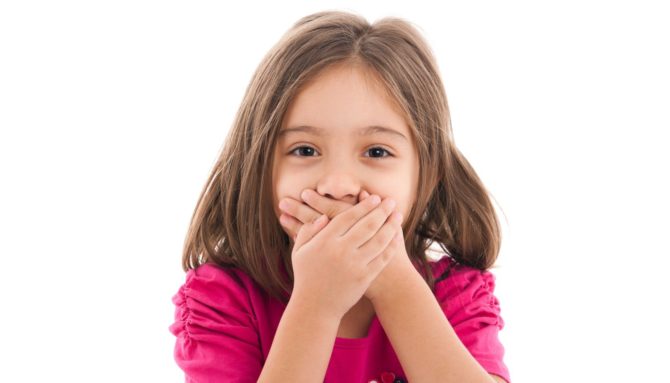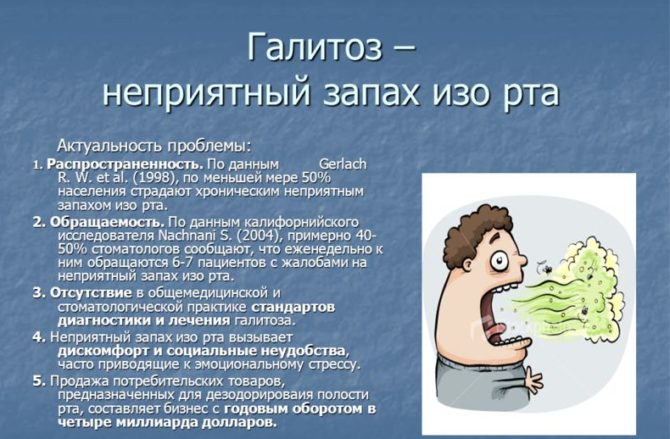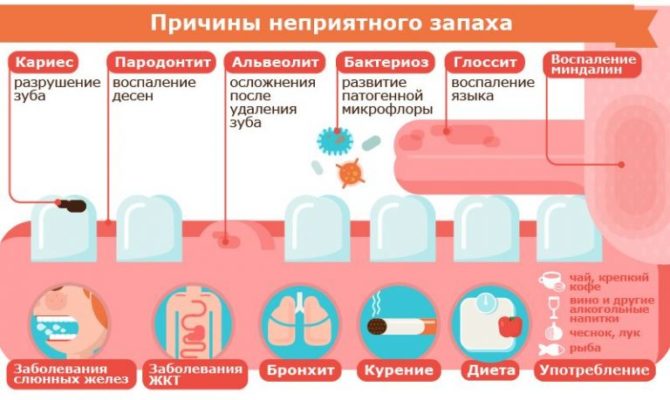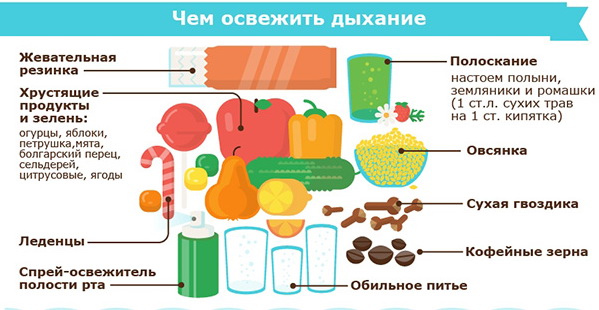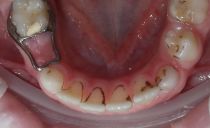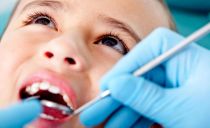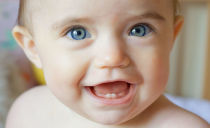Bad breath in a child: causes and treatment
Bad breath is less common in children than in adults. With age, there are many problems with teeth, and they are the most common prerequisite for the appearance of halitosis.: in four cases out of five. In the children's body, pathological changes leading to such consequences are not so frequent.
Content
The essence of the problem
Even in a healthy body, a small amount of unpleasantly smelling components is formed: hydrogen sulfide, ammonia. But they are either removed in a timely manner or converted into other compounds that do not have a toxic effect on the tissues.
A tangible aroma can occur if the process of biochemical transformations is disrupted, or malodorous substances are released in large quantities. They can be formed both as a result of internal, own processes of the human body, for example, during the decay of damaged tissues, and as a result of the stormy vital activity of microorganisms that live in various organs.
In such cases, the smell can be very noticeable both for the person himself and for the people around him, which in medicine is called true halitosis. When a weak unpleasant aroma is barely felt only by the person himself, they talk about pseudohalitosis.
If a person is obsessed with fear that a bad smell may come from him, but in fact he is not, this phenomenon is called halitophobia. But this is a psychological problem that concerns mainly adults or adolescents. If parents feel putrid breath from a child, then we are talking about true halitosis.
Should I worry
In both an adult and a young child, bad breath can appear as temporary halitosis, which occurs due to safe physiological phenomena, should not cause unrest and does not require treatment. The short appearance of a bad smell in a child occurs:
- When eating food, which, when digested and interacts with the microflora of the digestive tract, emits a strong specific smell: garlic, cabbage, onions, corn, grapes, cheese.
- With nervous tension, due to which the amount and composition of saliva changes.
- When the mucous membrane in the mouth dries due to a lack of fluid.
After feeding, the baby often regurgitates. This is due to the short length of the esophagus and the active ingestion of air simultaneously with food. After regurgitation, a newborn's mouth smells sour milk, which is already beginning to be digested. This phenomenon is safe and lasts for several months.
Trying to figure out why a child smells badly from his mouth, you need to determine how long the symptom persists, how often it appears and under what circumstances. If the smell is very harsh, purulent, gives out rotten eggs, has impurities of chemicals, appears regularly or does not disappear at all, it is worth contacting dentists and pediatricians for the diagnosis and treatment of internal diseases. Smell is only an external manifestation of a pathology that should be treated immediately.
Causes of bad breath in a child
Doctors have identified a connection between the properties of the smell and the diseases that it can accompany.It will not be possible to establish pathology only by this symptom, but it helps to determine the direction in the choice of diagnostic methods.
- If you get any unpleasant odor, for example, chemical, putrefactive, acidic, you should go to the dentist, since most of the diseases that cause halitosis are dental. Bad aroma appears when plaque accumulates and bacteria multiply actively due to improper or irregular brushing of teeth: less than twice a day. In children two years old and older, milk teeth can deteriorate, in adolescents - molars, caries are often on their crowns. Sometimes gums become inflamed, and stomatitis ulcers often appear on the mucous membrane, since children constantly pull their hands and various objects into their mouths.
- If the dentist has not found out why the child smells from the mouth, the reasons should be sought in the violation of internal organs. Putrid odor - an indicator of inflammation, accompanied by the release of pus. The baby should be reduced to ENT for examining the throat, tonsils, and examining the maxillary sinuses.
- The smell of rotten eggs from the oral cavity can be provoked by dysbiosis due to malnutrition or after taking antibiotics, inflammatory processes in the stomach and intestines.
- A smell with an admixture of acetone is a sign of a failure in carbohydrate metabolism, and diabetes can accompany it.
- The sweet odor from the oral cavity, giving off ammonia, is a sign of liver and kidney disease.
Treating bad breath in a child
It should be clearly understood that Bad breath in a baby is a symptom, not a disease. And if you use only symptomatic treatment to eliminate the unpleasant odor, it will still come back. To remove a bad purulent breath from a child, first of all, it is necessary to identify the cause of its occurrence. The second rule: treatment of the disease and careful care of all parts of the oral cavity should be carried out in parallel.
The methods of treatment depend on the type of pathology and may include:
- Filling or removing damaged teeth during the development of caries and other diseases of dental tissues.
- Anti-inflammatory therapy for the oral mucosa.
- Antibacterial therapy for stomatitis, infectious bacterial diseases of the respiratory system, filling the sinuses with pus.
- Antiviral therapy for virus infection.
- Anti-inflammatory therapy for the digestive system in diseases of the stomach and intestines.
- The use of hepatoprotectors with a decrease in liver functionality.
- Taking probiotics to normalize the symbiotic intestinal microflora.
- The use of general strengthening or immunomodulating agents.
Bad breath in a child of 6 years old or about this age may be due to proliferation of adenoids, then surgical treatment may be necessary. When filling the maxillary sinuses of the nose with accumulated pus, in advanced cases, punctures are made.
Hygiene rules
From a very young age, a child should be trained in regular hygiene; it is best to reinforce learning with a personal example. Caring for the oral cavity of young children remains entirely with the parents.
The child's mouth odor is 1 year old and earlier can be removed with moist clean gauze. She needs to wipe the gums and at the same time try to remove the plaque on the tongue - there is a large accumulation of microbes. Mom's hands should be clean and without long nails, so as not to injure the mucous membrane. Some parents perform this procedure with a clean little spoon.
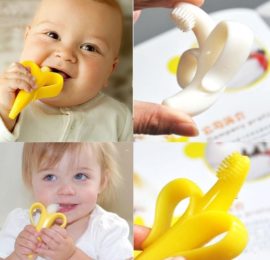 Now available are brushes designed specifically for babies. They can be used after teething of the first teeth without the risk of injury. When all the other baby teeth erupt, and the child becomes older, you can move on to using ordinary brushes, but only with soft bristles.
Now available are brushes designed specifically for babies. They can be used after teething of the first teeth without the risk of injury. When all the other baby teeth erupt, and the child becomes older, you can move on to using ordinary brushes, but only with soft bristles.
For a three-year-old baby, the use of the first children's toothpastes is allowed.Parents should diligently monitor the movements of the crumbs when cleaning, so that he does not injure himself and does not swallow a lot of pasta.
To prevent bad breath in a child of 4 years and older, you can rinse. They will help cleanse the mouth and eliminate food particles that are rotting. The best option is to brush your teeth twice a day, in the morning and before bedtime, and after eating, rinse your mouth with chamomile decoction, a pharmaceutical rinse without alcohol or boiled water.
Proper nutrition
The cause of a strong bad breath in a child can be malnutrition. Causal relationships between diet and halitosis and methods for solving the problem can be different:
- The baby smells from the mouth when eating certain sharply smelling foods. Therefore, you can not overfeed the child with such food.
- The lack of trace elements and vitamins in the food consumed can cause the destruction of dentin, enamel and a decrease in local immunity, which causes dysbiosis and any infectious diseases. Therefore, nutrition must be organized correctly, in the diet there must be a balance of animal and plant food.
- The use of products with an abundance of ballast substances (fiber) can provoke increased gas formation, dysbiosis, food retention in the digestive organs. This leads to the fact that the child stinks of rot from the mouth. The amount of cabbage, radish, radish in the diet should be within normal limits.
Drinking mode
It is necessary to monitor how much water the baby drinks daily. In the first three months, babies receive almost all the necessary liquid from milk, their need for water is about 50 ml per day per kilogram of weight. The same norm remains until the age of three. At 2 years old, a child’s mouth odor may appear if he drinks or receives less than 50 ml of water with liquid food.
A 5-year-old child may have bad breath if he receives less than 1.2 liters of fluid per day. Starting from primary school age, the average rate of water consumption in boys and girls approaches that in adults. A bad breath in a 7-year-old child will appear if he drinks less than 1.7–2.5 liters of fluid daily.
The methods for treating bad breath in children, as well as the causes of its occurrence, are very diverse. It is difficult to understand them yourself, and it is strictly forbidden to select treatment without the knowledge of a doctor. Therefore, when the aroma of rot or foreign chemicals appears, whether in the morning after sleep or throughout the day, you need to see a doctor.
Only a full-fledged diagnosis will help to find out why the smell from the child's mouth has become unpleasant, and how to cure it. The best prevention of the problem is the timely and thorough cleaning of the oral cavity in the morning after sleep and in the evening, as well as rinsing every time after eating throughout the day.

